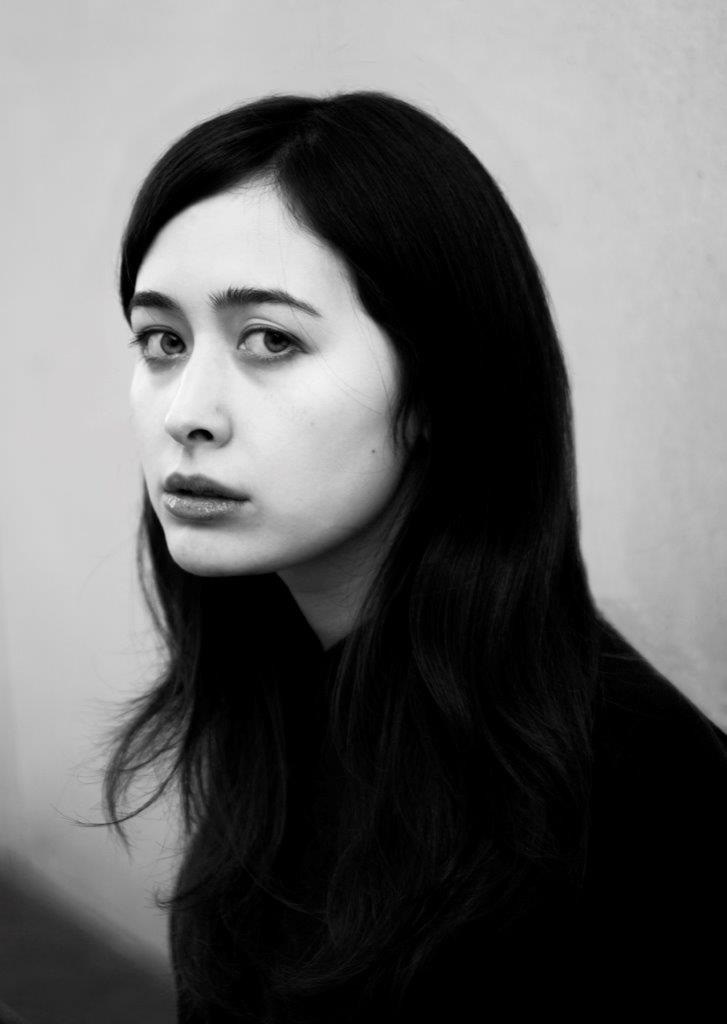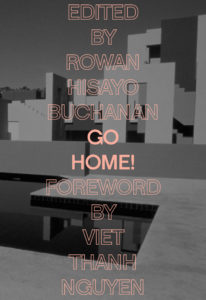Rowan Hisayo Buchanan is the author of Harmless Like You, winner of the 2017 Best First Novel Award from the Authors’ Club and the Betty Trask Award. Buchanan is also the editor of Go Home!, an anthology of Asian diasporic voices in poetry, prose, and memoir to be published in March 2018. Buchanan has also been published in Granta, The Paris Review, The Guardian, Electric Literature, and The Harvard Review among many others.
Shanna Kim (SK): Please introduce yourself and briefly describe your literary work and career path to date.
Rowan Hisayo Buchanan (RHB): My name is Rowan Hisayo Buchanan and I am the author of the novel, Harmless Like You. That book begins in the 1960s and is about Yuki Oyama, an artist who leaves her son when he is two years old. Harmless Like You was a New York Times Editors’ Pick and an NPR 2017 Great Read.
SK: Can you tell our readers about the genesis of Go Home!?
RHB: My novel, Harmless Like You, is a book about a Japanese-American artist growing up in New York. She abandons her son and disappears to Berlin. (Don’t worry, that’s not a spoiler—you find out very early!)
I was surprised to find certain interviewers asking, “Why didn’t she just go back to Japan?” I’d talk about Berlin, and art, and the fact that the character doesn’t really remember Japan. But I’d get an uneasy feeling in my belly. It echoed an idea I’d noticed before that as an immigrant you either assimilate, or you fail and return home. For so many people, their search for home is far more complex.
I’ve been answering the question, “What are you?” and “Where are you from?” for as long as I can remember. As a Japanese-Chinese-British-American person, it takes a while to answer. Often people laugh—as if I’ve made a joke. I have friends who describe more than one country as home, and I have friends who say they don’t feel at home anywhere. I have friends for whom home is an idea and those for whom it is family. All of these homes are made precarious when certain people feel free to yell—Go Home!
When I was asked to edit an anthology of Asian diasporic writers, I knew immediately I wanted to focus on the ideas of home. I wanted to let them create their own definitions. I wanted to take the slur and show how impossible it often is. I hoped it would bring support to those who needed it and that it would expand our tidy expectations of what a home might be.
SK: Can you tell us about any highlights you experienced during the editing and/or reading process?
RHB: This anthology interweaves writers at different stages of their careers. From the established voices of Alexander Chee, Chang Rae Lee, Kimiko Hahn, Gina Apostol, Amita Kumar et al., to writers who are just beginning to shine their light, and whose names you might be seeing on shelves soon—Sharlene Teo and T Kira Madden both have debuts coming very soon. Putting all these voices together in the same bound set of pages felt like throwing a good party.
The other thing I should mention is that a small number of the works were chosen from an open call. We received hundreds of submissions. There were so many really strong pieces of work. Many wrote very personal cover letters about their ideas of home. We couldn’t include all these writers but I was so warmed to hear from these talented, thoughtful people. It gave me great hope for literature that is yet to come.
SK: Can you tell us about your journey with the Asian American Writers’ Workshop and Feminist Press?
RHB: In 2015, I was awarded a fellowship with the Asian American Writers’ Workshop. This came during a time when I was quite isolated. They provided funding, support, and a sense of community. So, when the fellowship was done I stayed in touch, especially with Jyothi Natarajan, AAWW’s editorial director.
An editor at the Feminist Press reached out to me about doing a book-length project and I suggested an anthology. I knew some folk at AAWW had been discussing whether or not a print publication would be possible. Connecting the two organizations felt like the stars aligning.
We ended up working with Jisu Kim at the Feminist Press who was unflaggingly enthusiastic and inventive. Without Jyothi and Jisu, the project could never have come to be.
SK: In your Editor’s Note in Go Home! you write, “But this one book can’t contain all the vital voices. After you close the last page behind you, please open many more.” What do you hope readers will leave with after finishing it?
RHB: I hope that they finish reading with an openness to the many different kinds of home that people make. I hope that they realize that when someone tells you their idea of home that is the opening of a door. I hope that we learn to tread in each other’s homes with kindness and respect. And I hope that if readers are feeling wobbly and unsure about whether they belong, that the book can comfort them that they are not alone.
I was deeply touched by Ocean Vuong’s words. “I read this book and see my people—see us—and feel, in our collective outsiderhood, at home.” I could not have hoped for anything better.
SK: You’re being interviewed by a librarian, for an audience of progressive Asian American librarians. What are your thoughts on libraries and their place in supporting diverse communities?
RHB: This may sound like playing to the crowd, but libraries are so important. I wrote an essay for the Paris Review about a library bomb shelter. The head librarian believed that in the midst of war, books were “a respite from fear, an education, and beauty.” Libraries even without the threat of bombs are shelters. Books always have the potential to offer beauty and education. But libraries embody the especial miracle that they are available to all. They let everyone in no matter their background, or the amount of change in their wallet. That alone is a support to diverse communities.
That libraries exist at all is a wonder, but it is librarians who determine what makes it onto the shelves. Librarians have the power to guide readers to books they might otherwise miss. As a child, I was an outsider and a loner and it was the school library whose voices offered me a sense of peace. It was in a library that I first read Ruth Ozeki’s My Year of Meats. It was the first book I read by someone whose background even remotely resembled my own. She’s half Japanese, half Caucasian American. It would have been easy for my library to skip over Ozeki’s book. But it was there and it made me feel seen.
SK: We’re always looking for more to read! Who are three authors we should we be reading?
RHB: Eileen Chang—A Shanghainese writer from the 1940s. Her novels and stories are hilarious, cutting, and sometimes tragic. Love in A Fallen City is a good place to start.
Han Kang—The Vegetarian got a very much deserved amount of press. But Human Acts and the White Book are equally powerful. Human Acts is a novel about a massacre, yet manages to be deeply tender.
Ayòbámi Adébáyò— This author has only one book out so far. Stay With Me is funny, sad, and fiercely anti-patriarchal. When Yejjide can’t conceive, she faces many challenges. Will she be forced to accept her husband’s second wife? Why exactly can’t she conceive? And how much love do you need to save a marriage?
SK: What advice would you give young professionals, especially those from diverse backgrounds, who are interested in a career in writing?
RHB: First, try not to be downhearted if your journey doesn’t look like someone else’s. Everyone’s struggle is different and some are truly more difficult than others. When the going is slow don’t beat yourself up. Make the work, support work you believe in, and remember why you fell in love with this whole word game to begin with.
When that isn’t enough, look for community. Find other writers with whom you share interests, ideas, and beliefs. You are not in competition with each other. You are in competition with newsfeeds, Netflix, napping. These aren’t bad in and of themselves—but you must win your reader from them. Other writers will hold you up and support you. They will challenge and sharpen your thinking. They will wave the pom-poms when your work finds a home and they will commiserate when it doesn’t. You’ll meet some jerks, but if you can dodge them, you have a chance to make dear allies. You may find these other writers online, or in a class, or at a reading. There is no single right way to do it.
For those writers from diverse backgrounds who find themselves in suffocating rooms wondering why you are always the minority—your struggle is real. It is so easy to start blaming yourself or wondering if there is space for your story. For me, what helped was finding other writers who felt equally out of place. This can take extra effort. It can mean going to events organized to support diverse writers. It can mean slowing down as you leave your workshop, to match steps with that smart person who backs you up in discussion. It can mean getting the number of that deliciously snarky woman who sat next to you at the reading. It is hard and you have to be brave to put yourself out there. But it can make all the difference.
I’ve made dear friends this way. Their faces, sexualities, and family trees may not look identical to mine. But we had a need for each other’s stories. That is hugely powerful. I trusted their critiques of my writing and when something connected, it felt like lightning. It was also these communities who were most generous in supporting me when my novel Harmless Like You came out.
SK: Librarians are often found creating book lists. Can you create one for us, on any subject of your choosing?
RHB: Seven Books About Sharp-eyed Women. All these books feature women with sharp eyes and wits. They may not be nice women or the sort of women who would win a deportment prize. They do not always do the kindest thing. But these characters see the world without clichés or assumptions. Some of these books are brand new and others have been around for decades.
- Convenience Store Woman, Sayaka Murata
- Little Labours, Rivka Galchen
- Auto-Fiction, Hitomi Kanehara
- Forgotten Waltz, Anne Enright
- Sour Heart, Jenny Zhang
- Difficult Women, Roxane Gay
- Transit, Rachel Cusk
- Before You Suffocate Your Own Fool Self, Danielle Evans
SK: What are you working on now, and what’s coming up next?
RHB: I’m excited for the paperback of Harmless Like You, which comes out this July and I’m working on novel number two.
You can follow Rowan on social media at:
- Twitter: @rowanhlb
- Instagram: @rowanhisa
Editing assistance provided by Molly Higgins.



